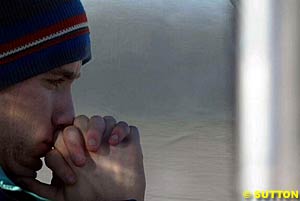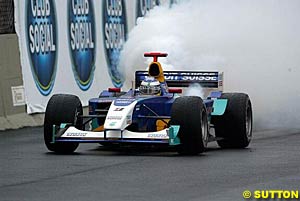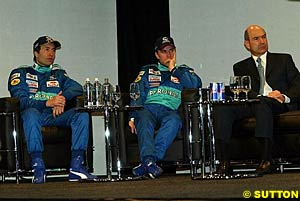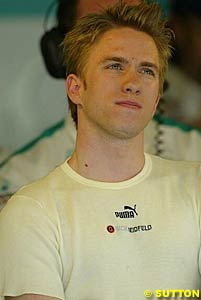
Atlas F1 Magazine Writer
What can you do, when you're a young and promising driver, in a mid-field car not capable of delivering you the World Championship? Just drive. David Cameron went to Monza last week, to see Nick Heidfeld do just that. Exclusive for Atlas F1
Sauber has brought two trucks and a catering van to the track, along with about forty staff, and they've hired the track just so that Heidfeld can drive around and around, faster and slower, bringing it in to tweak the car every few laps. All these people, all this money so that he can do what he loves to do. He brings the car into the pits at lunchtime because he's told to, cutting the engine and leaving the immense silence behind him as he walks through the pits to one of the trucks for a massage. The mechanics and engineers watch him as he walks by, knowing this is their signal to stop, and half of them going outside for a cigarette while the others go next door for lunch, as if in some unsaid shift.
The engineers and mechanics love working for Sauber, even though they know the team is not a winning one, and they love working with Heidfeld. When he walks through a room they watch him just like the fans do elsewhere, despite having worked with him for years and knowing him personally, and when he stops anywhere they move towards him and ask if there is anything they can do for him. Heidfeld seems oblivious to this, like all of the drivers are, presumably having become used to this as a way of life over the years.
After lunch one of the team members approaches me and asks if I'm interviewing Heidfeld and would I mind doing it outside, as it's too cold for him in the pit. I follow him over and shake hands with Heidfeld as the other man fetches a jacket for him. Heidfeld is a physically small man, like so many of the new breed of drivers, looking more like a jockey than the robust drivers of the past, and he has an intensity about him that is also common in the paddock.
Throughout our discussion he never averts his eyes from me unless someone comes to talk to him about the car, a subject of far more interest to him than our conversation, and this intensity can sometimes be disturbing. It's the focus that all the drivers have, and presumably they concentrate this way on everything in front of them, but it feels unusual to be focused on in this manner when it's directed at you.
He's right - no less a driver than Michael Schumacher constantly sings his praises when asked for his opinion on the younger drivers, and this approach works for him at Sauber. They are constantly pursuing the bigger teams, and time spent in the car can only help this pursuit.
I spoke to a couple of engineers at lunch, and they were fully behind Peter Sauber's decision not to join the Friday test sessions on track at the Grand Prix, because they feel that over the season the Friday testers will suffer from lack of performance enhancements, which can only come from extended testing periods like this. Does Heidfeld think Sauber made the right decision to opt out of the new test programme? "Yes," he says, "because I think we have the money to do quite a lot more testing than we would be allowed to do on this Friday."
The problem with this decision is there is a lot less running for the teams on a race weekend because of the new rules, which means it will be harder to set the car up for the race. "Yes, it is harder," Heidfeld states, "but then it is the same for everybody apart from three [four] teams." He agrees with the engineers who acknowledged that there was a set up compromise on race weekends, but it was one that they could live with.
DC: Do you think testing is going to help you defeat Renault?
Heidfeld: "No - at the moment I think we are too far behind."
DC: Would they still be a target?
NH: "Of course we try to do our best and beat them, but I would be surprised if we would at the end of the season (because) they are so strong - they had pole position at Malaysia, and that is more than most people expected. They have been on the podium twice now; they are really strong."
DC: What would be your target now? Is it fourth and maybe Williams drops down, or is it fifth?
NH: "No, I think the target should be fifth place."
DC: You don't think you can beat Ferrari thenů
Heidfeld laughs. "Of course not!"
When I spoke earlier to one of the engineers he said that Sauber usually tests for three days between each of the European races, which seems a large workload. "It depends," Heidfeld comments. "If we have the races in Europe I think it's okay to do even more. Next week is probably four days, because normally we split it anyway; Heinz does two days and I do one day or vice versa. So we could both do two days. But for us it's more of a question of the money - if we had more money we could do more testing."
I looked at the wall behind him and noticed a bicycle leaning against it, and realized that Heidfeld doesn't seem to have the same exercise regime as the other drivers - he gets fit by driving more.
Sauber have taken well to the new qualifying rules, running a bit lighter than the other teams and putting the cars further up the grid than they would be on pure speed. This has put the drivers further into the spotlight, which has made Heidfeld's reliability problems more noticeable.
"It's a little bit frustrating," he acknowledges. "On the first and third races I think there was a good chance to score some points, especially in Brazil, and we don't have a lot of those races over the season. Now we already had two with rain and other crazy things going on, and I was not able to finish in those races - I finished in Malaysia, where I pushed like mad but all I got was one point."
This seems to be the curse of the midfield teams - you can push like crazy and still not end up with anything to show for it. "Yeah," he laughs, "I think if I had finished the other two races I would have been in a bigger chance to score some more points" - which can only be frustrating when your teammate seems to be having all the luck in the team at the moment.
DC: How has it been working with Heinz in your team? You're both from the same town, which is a unique situation.
NH: "I think it's the first time it's happened in Formula One, but on the circuit it doesn't change anything. We get along well, but we didn't know each other very well because he's like ten years older than me. Okay, we met before, but on the circuit we just try to do our work."
DC: Does it help in the team that you are both German speakers?
DC: Nevertheless, Sauber being fairly German, does it feel like home to you?
NH: "Yes it feels a bit like home, but I don't think it has a lot to do with the language. It's simply the atmosphere within the team and the way people behave, and I've felt good within the team since the beginning. Now it's my third year and it makes it even easier."
The silly season seems to start earlier every year, and Heidfeld's current contract with Sauber finishes at the end of this one. Heidfeld's not playing the game yet - if he's given the matter any thought, he's not about to tell anyone about it.
DC: What are you thinking about for next year?
NH: "I don't know yet. I had a two year contract plus one year option from Peter's side, and at the end of the year it runs out - we have to see what happens."
Of course the biggest surprise in the paddock last year was Heidfeld's former teammate Kimi Raikkonen moving to McLaren, a team that Heidfeld has been closely tied to for a number of years. Many people were surprised that Heidfeld was overlooked despite his long-term contract with McLaren and wondered if he had subsequently cut ties with the company. "I still have a contract with McLaren Mercedes," he replies warily, clearly not wanting to discuss the matter, "but I can't tell you for how much longer that runs."
Formula One is a hard mistress, and she demands a lot from those involved with her. Heidfeld's career started at the ailing Prost team, a disastrous year after the successes of his German F3 and International F3000 titles, before stepping up to Sauber two years ago. Young drivers get into the sport because they love it, and only later develop the burning desire to get to Formula One because it's the pinnacle, the ultimate driving competition. But is it still fun at this level?
"Yes it's very joyful," Heidfeld confirms, "and the reason for me starting with this sport was the fun. It's still the fun that drives me, so I get most of my motivation because I just enjoy it. Then obviously I want to win, and it would be (even) more fun if I would be further up the grid."
DC: It seems like an amazing amount of work that you guys have to do - I was just wondering what the fun part is.
NH: "Well, now it is a whole testing, which is tiring but the thing I enjoy most is just sitting in the car, and driving the car."
DC: You just like going round lap after lap?
NH: "Yes. It can be tiring to do a lot of traveling, but the driving is the best part, you know."
DC: Even the testing?
NH: "Normally yes - as I said sometimes it gets tiring but usually I like to do it. I find that the three day test is on the limit - if we go to one circuit for four days it gets really boring; I did that once and didn't like that."
DC: Does it make any difference if you're the only team testing on a circuit, as here, rather than if you went to Barcelona where the other teams are?
NH: "Yes. It has up and down sides - you have a bit of comparison, but anyway you don't know how much fuel the other teams running are carrying, and you also have less rubber on the circuit so it takes longer to stabilise a bit and to get to a good speed. But on the other side you fully concentrate on yourself, that's what it's all about, and you have no red flags and no distractions."
He glances across at the pits, and I realise I'm being one of those distractions - so I let him get back to the car. It doesn't take him long - as I'm packing my bag I hear that familiar shriek as the mechanics start the engine up, and I know he's getting back to what he loves - sitting in his car, pounding out lap after lap again, coming in and out of the pits to test different parts so that he can make it faster, make it more fun.
He does it all so that he can just get to the race and drive.
He pounds around the circuit, round and round, time and again. He does it because he's a driver and it's what they do. He does it because he loves it, and he doesn't know of anything else to do. He does it because he can.
 Nick Heidfeld is testing components at Monza, and he is the only driver there. He has the track to himself and is in his element. The Autodromo di Monza is a beautiful place, a tree-lined track in the middle of a former royal park, but he doesn't see it - all he sees is the grey stretch of road in front of him and the next bend. He drops down a gear and powers into the corner, the gravel trap around it disappearing in his peripheral vision, while I drive along a service road listening to the howl of the engine and smiling; the sound of a Formula One engine driven in anger filtered through the trees of Monza is like nothing else I know.
Nick Heidfeld is testing components at Monza, and he is the only driver there. He has the track to himself and is in his element. The Autodromo di Monza is a beautiful place, a tree-lined track in the middle of a former royal park, but he doesn't see it - all he sees is the grey stretch of road in front of him and the next bend. He drops down a gear and powers into the corner, the gravel trap around it disappearing in his peripheral vision, while I drive along a service road listening to the howl of the engine and smiling; the sound of a Formula One engine driven in anger filtered through the trees of Monza is like nothing else I know.
 Heidfeld doesn't like the interview process, although he accepts that it's part of his job and is extremely courteous throughout. I could see that he'd rather be out on the track again if he had his way. It's probably this reluctance with the media which is behind his relative low profile outside of the paddock, but it doesn't worry him. "I think my profile in Formula One is quite good," Heidfeld comments on my theory. "Probably outside Formula One it's not as good as it is inside, but that doesn't really bother me. I also don't care if other people get more media attention than I do. My goal is just to move up and therefore I hope that the team bosses see that I'm doing a good job."
Heidfeld doesn't like the interview process, although he accepts that it's part of his job and is extremely courteous throughout. I could see that he'd rather be out on the track again if he had his way. It's probably this reluctance with the media which is behind his relative low profile outside of the paddock, but it doesn't worry him. "I think my profile in Formula One is quite good," Heidfeld comments on my theory. "Probably outside Formula One it's not as good as it is inside, but that doesn't really bother me. I also don't care if other people get more media attention than I do. My goal is just to move up and therefore I hope that the team bosses see that I'm doing a good job."
 The downside of the testing decision would seem to be the workload of the testing schedule. Not that it worries him much. "I enjoy all the testing," Heidfeld says. "It can be tough, as it is here when you just come back from Brazil - you arrive Monday afternoon and then you have to get up at like 07:30, which in Brazil time would be 03:30, so it's a bit mad to get up in the middle of the night and go testing. That's a bit tough, but usually I like to work. Over the whole season it would be nice after one race to have no test and relax a bit, but in general I like it. I actually want to do a lot of testing, because I want to be sure whether the parts we have are better or not."
The downside of the testing decision would seem to be the workload of the testing schedule. Not that it worries him much. "I enjoy all the testing," Heidfeld says. "It can be tough, as it is here when you just come back from Brazil - you arrive Monday afternoon and then you have to get up at like 07:30, which in Brazil time would be 03:30, so it's a bit mad to get up in the middle of the night and go testing. That's a bit tough, but usually I like to work. Over the whole season it would be nice after one race to have no test and relax a bit, but in general I like it. I actually want to do a lot of testing, because I want to be sure whether the parts we have are better or not."
 NH: "Not a lot because the meetings are held in English anyway. A lot of the engineers are not German - (there are) a lot of different nationalities, and I find it easier to do the meetings in English anyway because most of my time in motor racing I did the meetings in English, so I know a lot more things in English than in German."
NH: "Not a lot because the meetings are held in English anyway. A lot of the engineers are not German - (there are) a lot of different nationalities, and I find it easier to do the meetings in English anyway because most of my time in motor racing I did the meetings in English, so I know a lot more things in English than in German."
Please Contact Us for permission to republish this or any other material from Atlas F1.
|
Volume 9, Issue 16
Atlas F1 Exclusive
Giancarlo Fisichella: Through the Visor
Interview with Patrick Head
Interview with Nick Heidfeld
San Marino GP Preview
2003 San Marino GP Preview
San Marino Facts & Stats
Columns
The Fuel Stop
The F1 Trivia Quiz
Bookworm Critique
On the Road
Elsewhere in Racing
The Weekly Grapevine
> Homepage |